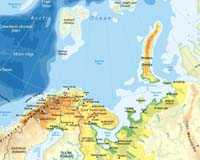| . |  |
. |
Moscow (UPI) Feb 9, 2011 Global climate change warming has opened possibilities for nations with arctic coastlines to exploit offshore energy resources in the usually ice-bound region. Norway's Parliament voted unanimously to ratify a 2010 agreement with Russia delineating their arctic borders, which opens the possibility of developing the vast oil and natural gas reserves in the Barents Sea. Parliament's Standing Committee on Foreign Affairs and Defense considered the delimitation treaty. Defending the agreement, Conservative party member Ivar Kristiansen said, "It is the committee's opinion that the agreement will be for the benefit of both nations and contribute to further stability in the area of the Barents Sea-Arctic Ocean and between nations, Norway and Russia." The agreement lifts a moratorium on prospecting the natural gas and oil deposits on the Arctic continental shelf, Golos Rossii news agency reported Wednesday. The talks between Russia and Norway took four decades to complete and affect an offshore area of 68,000 square miles. The negotiations over the territory were resolved in phases, with the first agreement on the "Varanger-Fjord" being reached in 2007. In April 2010 Russian President Dmitry Medvedev made a two-day state visit to Norway and met with Prime Minister Jens Stoltenberg, further advancing the negotiations, resulting in a treaty that was signed by Norwegian Foreign Minister Jonas Gahr Store and Russian Foreign Minister Sergei Lavrov in Murmansk in September. The 2010 agreement defined not only the maritime borders of the Barents Sea between Norway and Russia but covered fishery issues and maritime cooperation at sea issues as well, effectively ending the Russo-Norwegian territorial dispute. The area in contention was shared almost equally, with both Russia and Norway making concessions. The agreement gives both countries clearly defined borders as well as exclusive economic zones and rights to their assigned portions of the continental shelf. Russian Academy of Sciences academician Vasily Gutsulyak said: "What does Russia stand to gain from the agreement with Norway? Some people say nothing because the country gave up a certain chunk of its territory but I believe that certainty is better than uncertainty. "On coming into force, the Russian-Norwegian agreement will lift the moratorium on exploring the vast oil and gas deposits of the arctic, a hugely important development now since the old deposits are seriously depleted and drying up." The Russian Duma has to ratify the agreement a process that is expected to run smoothly. Store said: "According to signals I have received the Russian process is on track, even though it wasn't possible to achieve full compatibility. I believe the signals from Oslo will be taken note of."
Share This Article With Planet Earth
Related Links Beyond the Ice Age
 Norwegian house ratifies Arctic border agreement with Russia
Norwegian house ratifies Arctic border agreement with RussiaOslo (AFP) Feb 8, 2011 The Norwegian parliament on Tuesday ratified an accord reached with Russia on demarcating the two countries' maritime border in the Barents Sea, removing another hurdle to tapping suspected vast oil and gas reserves in the Arctic region. Norwegian Prime Minister Jens Stoltenberg and Russian President Dmitry Medvedev reached the deal in April last year, ending a 40-year dispute over a 176,00 ... read more |
|
| The content herein, unless otherwise known to be public domain, are Copyright 1995-2010 - SpaceDaily. AFP and UPI Wire Stories are copyright Agence France-Presse and United Press International. ESA Portal Reports are copyright European Space Agency. All NASA sourced material is public domain. Additional copyrights may apply in whole or part to other bona fide parties. Advertising does not imply endorsement,agreement or approval of any opinions, statements or information provided by SpaceDaily on any Web page published or hosted by SpaceDaily. Privacy Statement |